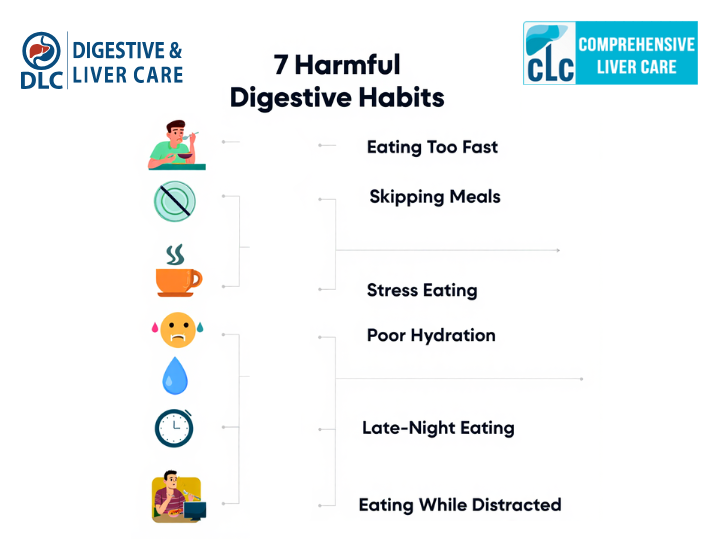Why You Should Consult a Highly Experienced Gastroenterologist and Hepatologist
- livercarecenter23
- Nov 8, 2025
- 3 min read
Digestive and liver health are critical for overall well-being. Problems in the gastrointestinal (GI) system or liver can lead to fatigue, nutrient deficiencies, and chronic illness. A highly experienced gastroenterologist and hepatologist specializes in diagnosing, treating, and managing these conditions. Their expertise ensures early detection, accurate diagnosis, and effective treatment for optimal digestive and liver health.

Whether it’s acid reflux, irritable bowel syndrome (IBS), inflammatory bowel disease (IBD), or liver disorders, consulting an expert gastro physician improves outcomes and quality of life.
Understanding Digestive and Liver Health
The digestive system includes the esophagus, stomach, intestines, pancreas, gallbladder, and liver. Each organ plays a crucial role in digestion, nutrient absorption, waste elimination, and metabolic regulation.
The liver, in particular, is essential for detoxification, bile production, and metabolism. A hepatologist focuses on liver-related issues, such as fatty liver disease, hepatitis, or cirrhosis, while a gastroenterologist addresses digestive disorders. A specialist trained in both fields provides comprehensive care for overall GI and liver wellness.
Common Digestive Disorders
1. Acid Reflux and GERD
GERD occurs when stomach acid flows back into the esophagus, causing heartburn, chest discomfort, and regurgitation. Untreated GERD may damage the esophagus lining, leading to complications such as esophagitis or Barrett’s esophagus.
2. Irritable Bowel Syndrome (IBS)
IBS manifests as abdominal pain, bloating, diarrhea, or constipation. It can be triggered by diet, stress, or gut sensitivity. Gastro physicians create personalized management plans with dietary guidance, lifestyle adjustments, and medications to control symptoms.
3. Inflammatory Bowel Disease (IBD)
IBD includes Crohn’s disease and ulcerative colitis, causing chronic GI inflammation. Symptoms include persistent diarrhea, abdominal pain, fatigue, and weight loss. Expert management with medications or biologics helps prevent long-term complications.
4. Gallbladder and Pancreatic Disorders
Gallstones, pancreatitis, and bile duct problems can cause severe abdominal pain, nausea, and vomiting. Treatment may involve minimally invasive procedures or surgery, depending on severity.
Liver Disorders Managed by Hepatologists
1. Fatty Liver Disease
Non-alcoholic fatty liver disease (NAFLD) is increasingly common due to lifestyle factors. Early intervention with diet, exercise, and medications can prevent progression to liver inflammation or cirrhosis.
2. Hepatitis
Viral hepatitis (A, B, C) can cause chronic liver disease if untreated. Vaccination, antiviral therapy, and lifestyle modifications are critical for prevention and management.
3. Cirrhosis
Advanced liver damage leads to scarring and impaired function. Early diagnosis and careful management are essential to slow disease progression.
Diagnostic Tools Used by Experienced Gastro Physicians
Highly experienced specialists use advanced diagnostics for precise treatment:
Endoscopy & Colonoscopy: Visual inspection of the GI tract and tissue biopsy for diagnosis.
Imaging Tests: Ultrasound, CT, and MRI to evaluate liver, pancreas, and gallbladder.
Laboratory Tests: Blood and stool tests for infections, malabsorption, or liver function.
Advanced Techniques: Capsule endoscopy, pH monitoring, and elastography for detailed evaluation.
Early and accurate diagnosis is key to successful treatment and prevention of complications.
Treatment and Lifestyle Management
1. Medications
Antacids and proton pump inhibitors for GERD
Antibiotics for infections like H. pylori
Biologics or immunosuppressants for IBD
Antiviral and liver-protective medications for hepatitis and fatty liver
2. Diet and Lifestyle Adjustments
Balanced, fiber-rich diet with vegetables, fruits, and lean proteins
Avoid spicy, fatty, and processed foods
Probiotics to maintain gut microbiome health
Regular exercise to support digestion and metabolism
Stress reduction through yoga, meditation, or therapy
3. Surgical and Advanced Interventions
Gallbladder removal or ERCP for bile duct issues
Liver biopsy or transplantation for advanced liver disease
Endoscopic procedures for polyps or intestinal obstructions
Preventive Care and Screening
1. Routine Checkups
Individuals with persistent digestive symptoms, liver disease risk factors, or a family history of GI disorders should consult a gastro physician regularly.
2. Screening and Vaccination
Colonoscopy for colorectal cancer starting at age 45–50
Hepatitis A and B vaccinations for liver protection
3. Nutrition and Physical Activity
Whole grains, fruits, vegetables, and lean proteins support gut and liver health
Daily exercise promotes bowel regularity and overall wellness
When to Consult a Gastroenterologist or Hepatologist
Seek expert consultation if you experience:
Persistent heartburn or abdominal discomfort
Blood in stool or dark, tarry stools
Unexplained weight loss or chronic fatigue
Jaundice (yellowing of eyes or skin)
Chronic diarrhea or constipation
Early intervention ensures accurate diagnosis, effective treatment, and improved outcomes.
Conclusion
Consulting a highly experienced gastroenterologist and hepatologist is essential for managing digestive and liver health. With advanced diagnostics, personalized treatment plans, lifestyle guidance, and preventive care, patients can maintain optimal GI and liver wellness. Early detection, regular checkups, and informed lifestyle choices play a critical role in improving quality of life and preventing long-term complications.



Comments